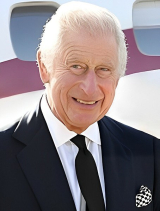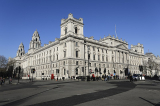UK News
-
 Virgin Trains sets sights on West Coast route comeback
Virgin Trains is eyeing a return to operating rail services on the West Coast route connecting London and Glasgow, marking a potential comeback five years after losing the franchise.Read More...
Virgin Trains sets sights on West Coast route comeback
Virgin Trains is eyeing a return to operating rail services on the West Coast route connecting London and Glasgow, marking a potential comeback five years after losing the franchise.Read More... -
 King Charles, Queen Camilla, and Prince William to attend D-Day commemorations in Normandy
King Charles, Queen Camilla, and Prince William will participate in events in Normandy to mark the 80th anniversary of D-Day, Buckingham Palace announced.Read More...
King Charles, Queen Camilla, and Prince William to attend D-Day commemorations in Normandy
King Charles, Queen Camilla, and Prince William will participate in events in Normandy to mark the 80th anniversary of D-Day, Buckingham Palace announced.Read More... -
 M&S website and App experience technical issues
Marks and Spencer's website and app have faced significant technical difficulties, leaving customers unable to access their services for several hours. While the website is now operational,Read More...
M&S website and App experience technical issues
Marks and Spencer's website and app have faced significant technical difficulties, leaving customers unable to access their services for several hours. While the website is now operational,Read More... -
 New pathway for Irish nationals to obtain British citizenship nears approval
A simplified route for citizens of the Republic of Ireland to acquire British citizenship is close to becoming law. The British Nationality (Irish Citizens) Bill, which has already passed theRead More...
New pathway for Irish nationals to obtain British citizenship nears approval
A simplified route for citizens of the Republic of Ireland to acquire British citizenship is close to becoming law. The British Nationality (Irish Citizens) Bill, which has already passed theRead More... -
 Severn Trent CEO defends multi-million pay amid rising sewage spills
Severn Trent's chief executive, Liv Garfield, has defended her multi-million pound compensation package despite a significant increase in sewage spills by the company in 2023.Read More...
Severn Trent CEO defends multi-million pay amid rising sewage spills
Severn Trent's chief executive, Liv Garfield, has defended her multi-million pound compensation package despite a significant increase in sewage spills by the company in 2023.Read More...

Culture
-
 London's best kept secret: the hidden garden amidst ruins near London Bridge
Tucked away just a stone's throw from London Bridge lies one of the city's most enchanting secrets. The ruins of St Dunstan-in-the-East church stand quietly, almost unnoticed amidst theRead More...
London's best kept secret: the hidden garden amidst ruins near London Bridge
Tucked away just a stone's throw from London Bridge lies one of the city's most enchanting secrets. The ruins of St Dunstan-in-the-East church stand quietly, almost unnoticed amidst theRead More... -
 Sir Paul McCartney becomes first UK billionaire musician
Sir Paul McCartney has made history as the first UK musician to become a billionaire, according to the Sunday Times Rich List. The 81-year-old former Beatle increased his wealth by £50 millionRead More...
Sir Paul McCartney becomes first UK billionaire musician
Sir Paul McCartney has made history as the first UK musician to become a billionaire, according to the Sunday Times Rich List. The 81-year-old former Beatle increased his wealth by £50 millionRead More... -
 London welcomes Gucci's high-stakes debut cruise collection
As dusk descended over the River Thames, the anticipation outside London's iconic Tate Modern was palpable. Among the luminaries gracing the event were supermodel Kate Moss, actressRead More...
London welcomes Gucci's high-stakes debut cruise collection
As dusk descended over the River Thames, the anticipation outside London's iconic Tate Modern was palpable. Among the luminaries gracing the event were supermodel Kate Moss, actressRead More... -
 Dutch Eurovision contestant Joost Klein disqualified after backstage incident
The Dutch artist Joost Klein has been disqualified from the Eurovision Song Contest following a backstage incident, as reported by Swedish police after a female member of the productionRead More...
Dutch Eurovision contestant Joost Klein disqualified after backstage incident
The Dutch artist Joost Klein has been disqualified from the Eurovision Song Contest following a backstage incident, as reported by Swedish police after a female member of the productionRead More... -
 King Charles assumes historic patronage ties to monarchy spanning over 200 years
In 2022, Buckingham Palace announced a comprehensive review of all royal patronages. Following the passing of Queen Elizabeth II, nearly 500 charities and organizations found themselvesRead More...
King Charles assumes historic patronage ties to monarchy spanning over 200 years
In 2022, Buckingham Palace announced a comprehensive review of all royal patronages. Following the passing of Queen Elizabeth II, nearly 500 charities and organizations found themselvesRead More... -
 Homes England pledges £120,000 investment in Northstowe community initiatives
Homes England, the governmental body overseeing housing and urban revitalization efforts, has unveiled plans to allocate £120,000 in grant funding to support community-driven initiativesRead More...
Homes England pledges £120,000 investment in Northstowe community initiatives
Homes England, the governmental body overseeing housing and urban revitalization efforts, has unveiled plans to allocate £120,000 in grant funding to support community-driven initiativesRead More... -
 Fake Monet and Renoir paintings detected on eBay using AI
Up to 40 counterfeit paintings, including alleged works by Monet and Renoir, have been identified for sale on eBay, according to research conducted by Dr. Carina Popovici, an expertRead More...
Fake Monet and Renoir paintings detected on eBay using AI
Up to 40 counterfeit paintings, including alleged works by Monet and Renoir, have been identified for sale on eBay, according to research conducted by Dr. Carina Popovici, an expertRead More... -
 Pippa Middleton and James Matthews unveil lodge at Bucklebury Farm
Pippa Middleton and her billionaire husband James Matthews have inaugurated the lodge at Bucklebury Farm Park in Berkshire, offering a venue for parties, events, and Pilates sessions.Read More...
Pippa Middleton and James Matthews unveil lodge at Bucklebury Farm
Pippa Middleton and her billionaire husband James Matthews have inaugurated the lodge at Bucklebury Farm Park in Berkshire, offering a venue for parties, events, and Pilates sessions.Read More... -
 Five British museums nominated for prestigious arts prize
Museums across Skipton, Dundee, Manchester, and London are vying for the esteemed title of Museum of the Year 2024.Read More...
Five British museums nominated for prestigious arts prize
Museums across Skipton, Dundee, Manchester, and London are vying for the esteemed title of Museum of the Year 2024.Read More... -
 Gustav Klimt portrait sells for £25.7 million at Vienna auction
A long-lost portrait by Gustav Klimt, depicting a young woman, fetched a staggering 30 million euros (£25.7 million) at an auction held in Vienna on Wednesday.Read More...
Gustav Klimt portrait sells for £25.7 million at Vienna auction
A long-lost portrait by Gustav Klimt, depicting a young woman, fetched a staggering 30 million euros (£25.7 million) at an auction held in Vienna on Wednesday.Read More... -
 Rishi Sunak: remembering those lost in terror attack
In his Passover message to the Jewish community, Prime Minister Rishi Sunak acknowledges the somber reality that "for too many families, there will be empty seats" at the Seder table thisRead More...
Rishi Sunak: remembering those lost in terror attack
In his Passover message to the Jewish community, Prime Minister Rishi Sunak acknowledges the somber reality that "for too many families, there will be empty seats" at the Seder table thisRead More... -
 Co-op Live: Manchester's new arena opens with high capacity and ambitions
A monumental addition to Manchester's entertainment landscape, the new £365m Co-op Live arena is poised to claim the title of the largest indoor arena in the UK. Nestled beside ManchesterRead More...
Co-op Live: Manchester's new arena opens with high capacity and ambitions
A monumental addition to Manchester's entertainment landscape, the new £365m Co-op Live arena is poised to claim the title of the largest indoor arena in the UK. Nestled beside ManchesterRead More... -
 Brontë birthplace unveils open day prior to renovation
The birthplace of the renowned Brontë sisters is set to welcome visitors for a special glimpse inside before embarking on a significant refurbishment.Read More...
Brontë birthplace unveils open day prior to renovation
The birthplace of the renowned Brontë sisters is set to welcome visitors for a special glimpse inside before embarking on a significant refurbishment.Read More...

British Queen celebrates
Most Read
- Teen held after US woman killed in London stabbings
- Heave-ho Harry! Prince prepares to join the walking wounded in ice trek to North Pole
- Football: Farhad Moshiri adamant Everton deal above board
- "Master of English Style". Interview with Designer Lydia Dart
- Letter to the Financial Times from Lord Mayor Alderman Michael Bear
World News

AirAsia and All Nippon Airways are set to announce the dissolution of their tie-up in Japan on Tuesday, reports said, because of slumping business.
Malaysia-based AirAsia is to withdraw from AirAsia Japan, a company it jointly formed with ANA to begin low-cost carrier operations out of Tokyo's Narita International Airport in August 2012, Kyodo News reported, citing unnamed sources familiar with the matter.
AirAsia aims to establish a new budget airline in partnership with another Japanese carrier after parting company with ANA, Kyodo said.
A senior AirAsia executive told the newswire on Monday that the company had made its decision and an announcement would be made Tuesday.

Tax evasion and banking secrecy, hot topics and top targets because of the financial crises and austerity, could be the focus of strong statements at the G8 meeting this week.
The British government, organising the meeting in Northern Ireland, has promised big developments on the basis of substantial progress recently in clamping down on evasion and bursting bank secrecy.
But many observers from civic bodies are pessimistic and say that the summit on Monday and Tuesday will amount to a lost opportunity despite the public outrage over recent brazen cases at a time of tax rises and budget cuts.
The tightening up of tax systems across borders, and opening up information on how businesses do their accounting across borders, are two of the burning issues for Britain which is currently chairing the G8 (Group of Eight) leading countries.
The G8 comprises the United States, Japan, Germany, France, Canada, Britain, Italy and Russia.
British Prime Minister David Cameron has prepared the way for the summit of heads and state and government by stating the "ambition" that the meeting at Lough Erne will "knock down the walls of banking secrecy" with "concrete measures".
French President Francois Hollande, badly bruised by a recent scandal involving an admission by his budget minister Jerome Cahuzac, also responsible for fighting tax evasion, that he had hidden money abroad, has said: "Tax havens must be eradicated in Europe and throughout the world."
The climate has turned strongly in favour of tough action: pressure on these two fronts, which seemed to have eased after progress in 2009, is again at a high pitch.
First, a new law in the United States, called Fatca, obliges all banks to provide US authorities with all information they hold concerning all assets owned by US taxpayers.
Meanwhile, revelations by journalists, known as "Offshore Leaks", have further strengthened the perception that no bank account can be considered secret and that hidden funds are liable to exposure.
The consequence of this is that the gates of some strongholds of banking secrecy, such as Switzerland, are beginning to give way.
The European Union, in which some countries have arrangements considered favourable to those seeking to dissimulate funds, seems to be overcoming internal divisions and trying to catch up with the United States, even though Austria and Luxembourg still show some reticence.
The G8 leaders are expected to make strong statements calling for a "truly global system of multinational information exchange", according to a draft final statement. But concrete measures appear unlikely.
Cameron has opened a second front to combat strategies by multinational companies to avoid paying tax via transfer pricing and other techniques to generate costs in high-tax countries and profits in low-tax countries or tax havens.
ublic opinion in several countries, already inflamed by stories of tax evasion and tax avoidance at a time of austerity, has been roused further by revelations in the United States and Europe that international brands such as Starbucks, Google, Amazon and Apple, pay little tax in countries where they have high-volume business.

A wave of car bombs in several cities south of Baghdad on Sunday killed at least 14 people, officials said, as Iraq grapples with a surge in violence that has sparked fears of all-out sectarian war.
The blasts went off during morning rush hour in Kut and Aziziyah, both in Wasit province bordering the capital, while vehicles rigged with explosives were also detonated in the southern cities of Nasiriyah and Basra.
At least 14 people were killed and 44 wounded in the attacks, security and medical officials said.
The deadliest attacks struck in Kut and Aziziyah.

Greece's public TV and radio channels were off the air Wednesday after a shock decision by the government to shut down the state broadcaster's operations with immediate effect, a move affecting nearly 2,700 jobs.
Thousands rushed to the broadcaster's main headquarters in a northern Athens suburb shortly after the announcement Tuesday to show their support.
"ERT is a case of an exceptional lack of transparency and incredible extravagance. This ends now," government spokesman Simos Kedikoglou said at a news conference.
His announcement comes after months of work stoppages by ERT employees in opposition to plans to restructure the broadcaster as demanded by debt-laden Greece's troika of international creditors.
Nearly 500 people also gathered outside the organisation's Thessaloniki branch in northern Greece as news editors union Poesy called on private broadcasters to hold an immediate work stoppage in solidarity.
Kedikoglou said the organisation will reopen at a later stage under a new format and with considerably fewer employees.
As screens around the country went black, the corridors of the broadcaster's headquarters were filled with stunned employees, who seemed at a loss, an AFP journalist reported.
"This is a total shock," ERT journalist Pantelis Gonos told AFP.

The European Commission on Wednesday gave Latvia a green light to join the 17-nation eurozone in January, saying the country met the conditions to join the single currency and had successfully overcome its 2008-2009 crisis.
"The Commission concludes that Latvia is ready to adopt the euro in 2014," said a report from the EU executive commending the country's economic management over the last few years.
The report will be handed to the European Parliament and to finance ministers from the 17 nations sharing the currency, who in July will formally hand down a decision on Latvia becoming the 18th member of the euro area.
The Commission said "Latvia has achieved a high degree of sustainable economic convergence with the euro area and proposes that the Council decide on Latvia's adoption of the euro as from 1 January 2014."
The EU said Riga satisfied the economic conditions to join -- in terms of price stability and sound public finances -- and that its national legislation was compatible with the rules of Economic and Monetary Union (EMU).

The eurozone unemployment rate hit a fresh record of 12.2 percent in April, with 19.2 million people on the dole as recession continued to sap the economy.
The Eurostat data agency said that in the 12 months to April a total 1.6 million people lost their jobs in the 17-nation eurozone, and an extra 95,000 people joined unemployment queues in the month alone from March to April this year.
As the jobless rate in the eurozone climbed for the 24th consecutive month, there was some respite in the full 27-nation European Union where unemployment remained stable in April at 11.0 percent.
In total, 26.6 million people were out of work in the full EU in April and 19.3 million in the eurozone.

US Secretary of State John Kerry raised questions Friday about Russia's commitment to peace in Syria, warning that delivery of Russian S-300 air defense missiles would be "not helpful."
Kerry's comments at a news conference with German Foreign Minister Guido Westerwelle came ahead of a preparatory meeting in Geneva next week on a US-Russian bid for a peace conference on Syria.
"In Geneva, we will test who is serious. Are Russians serious about pushing for that? I believe they are. President (Vladimir) Putin said they are, (Foreign Minister) Sergei Lavrov has said it and they are trying to organize.

EU and Chinese trade officials will meet informally on Monday amid a series of tit-for-tat disputes, the European Commission said, after news of yet another row, this time over chemicals, surfaced.
The meeting comes as Brussels prepares on June 5 to impose hefty anti-dumping tariffs on imports of Chinese solar panels, just one area of discord that this month alone has included telecoms and steel tubes.
"I can confirm that the Chinese government has requested that Vice Minister Zhong Shan be received by EU Trade Commissioner Karel De Gucht in Brussels on Monday," EU Trade Spokesman John Clancy said.
"The meeting is informal only," Clancy said, adding that the anti-dumping tariff would still come into force under EU procedures before any formal talks to resolve the issue could take place with Beijing.
"As all parties are aware, formal discussions towards a negotiated settlement in the solar panels case can only begin -- as stipulated by the legal trade defence framework -- should a decision be taken to impose provisional measures."
Chinese Vice Minister Zhong was already in Brussels for a regular meeting with his EU counterparts.
Separately, the Commission confirmed that Beijing was investigating a complaint against several European chemical companies for alleged dumping.
This is the second anti-dumping move by China against European industry in less than two weeks after a complaint against European companies making unwelded pipes.

Russian President Vladimir Putin and Israeli Prime Minister Benjamin Netanyahu were set Tuesday to hold talks on the conflict in Syria amid growing concern about Moscow's arms deliveries to the Damascus regime amid a spiralling death toll.
Netanyahu is just the latest world leader to beat a path to Putin's door for talks on Syria in recent days, after US Secretary of State John Kerry and British Prime Minister David Cameron met the Russian strongman last week.
In the wake of the talks with Netanyahu at Putin's vacation residence in the southern resort of Sochi, UN Secretary General Ban Ki-moon is also due to travel to Russia later this week.
"The situation (in Syria) unfortunately has a tendency towards a further escalation which can only arouse great concern on the part of Russia... and Israel," Putin's spokesman Dmitry Peskov said ahead of the talks with Netanyahu, quoted by Russian news agencies.
The West and Russia have been repeatedly at odds over the Syria conflict, with the United States and Europe accusing Moscow of seeking to prop up President Bashar al-Assad and supplying his regime with military hardware.
The flurry of diplomatic activity indicates some hope on the part of the West that Russia could be persuaded to soften its line over a conflict that according to activists has now killed over 80,000 people.
The West and Israel are particularly concerned about Russia's refusal to rule out further deliveries to Syria of advanced S-300 missile batteries under an existing contract.
Netanhayu is expected to emphatically warn Putin against delivering such weaponry which would severely complicate any future air attacks against the Assad regime.

Finance ministers and central bank chiefs from the Group of Seven leading economies will meet in the English countryside on Friday for talks on spurring growth, amid US-Europe divisions over the scale of austerity.
The G7 -- comprising Britain, Canada, France, Germany, Italy, Japan and the United States -- is expected to build on last month's wider Group of 20 meeting, while looking ahead to next month's G8 heads of state summit in Northern Ireland.
Britain is this year president of the G8 -- or G7 plus Russia -- and is using the platform to also push for greater multilateral co-operation in tackling tax evasion.
The foreign exchange market is also likely to feature high on the agenda after the dollar topped 100 yen for the first time in more than four years overnight, as Tokyo's aggressive stimulus efforts to reflate the Japanese economy continue to depress its currency.
Ahead of the two-day G7 meeting at Hartwell House, in Buckinghamshire, north of London, the United States has meanwhile called on Europe to further ease fiscal consolidation to avoid more economic damage.
Europe's leaders have been successful at removing some of the more immediate risks in the eurozone debt crisis, a senior US Treasury official told reporters.
"Now the focus needs to shift to boosting demand and employment, to avoid lasting damage to the economy," the official told a briefing.
"It's important to recalibrate the pace of fiscal consolidation...continued sharp fiscal consolidation risks undermining demand."
The European Union recently granted France two extra years to meet its deficit target on condition that it pursues reforms. But France has made clear that it does not want to go down a path of deep austerity as seen in neighbouring eurozone countries Italy and Spain.
A French source told AFP on Thursday that "it is counter-productive to set (deficit-reduction) targets that are impossible to reach because it will destroy the motor" of the economy.
And the International Monetary Fund, while welcoming efforts by indebted nations to cut state spending, has urged Britain to lessen the pace of its austerity programme to support the country's fragile economic recovery.
"We will be talking about the global economic situation and how to nurture the recovery," said British Chancellor of the Exchequer George Osborne, who will host the G7 gathering.
He added that participants will also be "talking about the fiscal issues we all face and how we can make sure that our public finances are in good order".
Prime Minister David Cameron insisted Thursday that Britain was not bringing down the deficit "at an irresponsible pace".
He added: "We're doing it at a sensible and measured pace. It absolutely has to be done and it will be done."
Victoria Clarke, an economist at Investec financial group, said that at the meeting Osborne might seek "support from other fiscally cautious members such as Germany, to continue with his fiscal policy plan rather than relax the pace of austerity as some, including the IMF, have been suggesting".




















